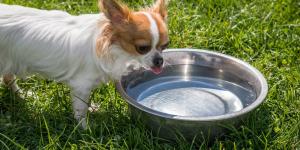My Old Dog Is Drinking Lots of Water



See files for Dogs
Although it depends on many individual factors, a dog should drink around 100 ml of water per kilogram of their weight per day. We can sometimes see an increase in a dog's water consumption for various reasons. This is known as polydipsia in veterinary medicine. When a dog exhibits any physical or behavioral changes, we need to look at them in context. When a dog is a senior, there are some issues which are more likely than when a younger dog drinks more water.
At AnimalWised, we find out why my old dog is drinking lots of water. We do so by looking at the causes of polydipsia in senior dogs and what possible treatment options may be available to them.
Chronic kidney disease
Chronic kidney disease (CKD) is a common disorder in older dogs. in fact, it is the third leading cause of senior dog death. If you are wondering why your old dog is drinking a lot of water, one of our first suspicions should be the possibility of kidney failure in dogs.
Dogs with CKD suffer kidney damage that triggers a progressive, permanent and irreversible loss of kidney function. As a consequence of the functional deterioration of the kidney, numerous clinical signs appear, among which polyuria (increased urine volume) and polydipsia (increased water consumption) stand out.
Polyuria and polydipsia appear due to a reduction in the number of nephrons, i.e. functional units of the kidney. The surviving nephrons increase their filtration as a compensatory mechanism. Consequently, osmotically active solutes accumulate in the renal tubules, preventing water reabsorption and increasing urine output. To prevent dehydration, dogs try to compensate for the increased urine output by drinking a larger volume of water. If your old dog urinates a lot and drinks a lot of water, this may be the answer.
In addition to these clinical signs, dogs with CKD may present:
- Depression
- Anorexia
- Weight loss
- Vomiting and diarrhea
- Dehydration
- Encephalopathy
- Uremic stomatitis
- Bleeding diathesis
- Anemia
- Blindness
- Bone alterations
Treatment of CKD in dogs
As we have mentioned, the loss of renal function in these patients is irreversible. Unfortunately, there is no curative therapy. Treatment is based on slowing down the progression of the disease through symptomatic and nephroprotective actions. Specifically, the treatment is based on two main factors:
- Medical treatment: aimed at correcting hydroelectrolytic imbalances and systemic hypertension.
- Renal diet: low in protein, sodium and potassium and rich in omega 3 fatty acids for dogs, soluble fiber and antioxidants.
If your dog has kidney failure, you will need to speak to your veterinarian about symptom management. They will be able to instruct you on the various lifestyle changes your dog will need to make, including how to create a homemade diet for dogs with kidney failure.
Cushing's syndrome
Also known as hyperadrenocorticism, Cushing's disease is one of the most frequent endocrine diseases from which dogs may suffer. This is especially so for dogs of advanced age.
It is a process characterized by the existence of excessive and chronic levels of glucocorticoids and, to a lesser extent, mineralocorticoids. Mineralocorticoid excess decreases antidiuretic hormone (ADH) synthesis, leading to increased urination (polyuria). To compensate, dogs increase their water intake to avoid dehydration.
Although polyuria and polydipsia are the most frequent signs of Cushing's syndrome in dogs, it is also possible to observe other symptoms such as:
- Polyphagia (increased appetite)
- Weight gain
- Lethargy and exercise intolerance
- Pendulous abdomen
- Thinning of skin
- Bilateral and symmetric alopecia
- Skin hyperpigmentation
- Calcinosis cutis
- Excessive panting
Treatment of Cushing's syndrome in dogs
Cushing's syndrome can affect the pituitary and/or adrenal glands. Treatment will depend on which are most affected:
- Pituitary Cushing's disease: the treatment of choice is trilostane, a drug that reversibly decreases cortisol synthesis.
- Adrenal Cushing's disease: Requires pharmacological treatment with trilostane, followed by surgical removal of the adrenal glands (adrenalectomy).
Cushing's disease can cause a hyper-calcification of the blood, leading to lesions on the skin. Learn more with our article on calcinosis cutis in dogs.
Diabetes mellitus
Around 1 in 500 dogs suffer from diabetes mellitus, with type I diabetes being the most prevalent in canines. Specifically, middle-aged and older dogs are the most likely to develop the disease. Unneutered females and certain breeds such as the Beagle, Poodle or Schnauzer are also at risk.
Type I diabetes in dogs occurs as a result of a primary injury to the pancreas, which prevents pancreatic cells from producing insulin. As a consequence, the cells are not able to capture the glucose present in the blood and its levels increase (hyperglycemia). When it exceeds a certain threshold, glucose is filtered by the kidney, dragging water with it and increasing the volume of urine (polyuria). As a consequence, the body responds by increasing water intake (polydipsia) to avoid dehydration.
The clinical picture of diabetic patients is characterized by ‘the 3 P's’. Polyuria and polydipsia, have already been mentioned. Added to these are polyphagia (greater appetite). Weight loss is also common. Therefore, if your older dog drinks a lot of water and eats normally, but loses weight, they may have diabetes.
Treatment of diabetes in dogs
Despite being a chronic pathology for which there is no curative treatment, correct therapeutic management allows diabetic dogs to enjoy a good quality of life. Specifically, treatment should be based on:
- Insulin administration: insulin for dogs with diabetes is administered via subcutaneous injections.
- Dietary management: diet reduced in fat (<15% fat), high in fiber (15-22% fiber) and with normal protein levels (20% protein).
- Regular exercise: helps to avoid other issues such obesity which can worsen the clinical picture.
Tumors
Tumors or neoplasms are geriatric diseases with an incidence that increases progressively as dogs age. Old dogs are most affected as the average age of tumor development is 9 years.
Some tumors, such as lymphosarcomas, carcinomas or adenocarcinomas of the anal sacs, tend to produce hypercalcemia (increased calcium in the blood). They do so by releasing or interacting with the hormones responsible for regulating calcium levels in the blood. This hypercalcemia can produce cause polydipsia in senior dogs, among other clinical signs. If you are wondering why my older dog drinks a lot of water, you should know that a tumor may be responsible.
Find out some general guidelines for detecting such diseases with our complete senior dog care guide.

Primary hyperparathyroidism
Primary hyperparathyroidism is an endocrine disease that affects older dogs (average 11 years). Certain breeds are more commonly affected, including the Labrador Retriever, German Shepherd and the Keeshond. It occurs as a result of an injury to the parathyroid gland, which alters the production of parathormone (PTH) and causes an increase in calcium levels in the blood (hypercalcemia).
As mentioned above, hypercalcemia causes a very marked increase in urine output and water consumption. In addition, it is possible to observe:
- Weakness
- Exercise intolerance
- Anorexia
- Vomiting
- Depression
- Stupor
Treatment of canine hypercalcemia
In cases of severe hypercalcemia, it is necessary to reduce calcium levels in the blood through fluid therapy, corticosteroids, furosemide and bisphosphonates. After these therapies are administered, it is necessary to perform surgical intervention (parathyroidectomy) to eliminate the cause of the pathology.
As you have seen, all the causes that cause an old dog to drink more water than normal and urinate more must be treated by a specialist. It is essential to go to the veterinary center as soon as your see any abnormal physical or behavioral symptoms.
Another symptom to look out for in senior dogs is appetite loss. Find out more with our article on why my old dog isn't eating anymore.

This article is purely informative. AnimalWised does not have the authority to prescribe any veterinary treatment or create a diagnosis. We invite you to take your pet to the veterinarian if they are suffering from any condition or pain.
If you want to read similar articles to My Old Dog Is Drinking Lots of Water, we recommend you visit our Other health problems category.






